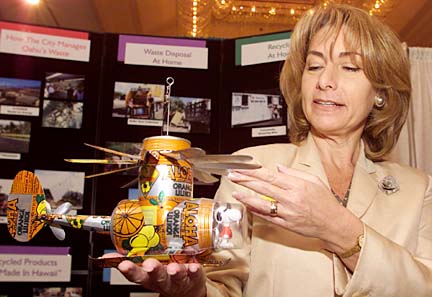


Asia-Pacific Taking care of the environment and taking care of people's economic well-being are complementary issues, agreed presenters and attendees yesterday at the Mayors' Asia-Pacific Environmental Summit.
mayors talk
trash, trees
Environmental issues come to
the forefront at a Waikiki summit
of regional city chiefsBy Diana Leone
Star-Bulletin"We cannot make something like an isolated environmental policy," opening-day speaker Klaus Topfer said. "We must do whatever is possible to prove that environmental management is an investment in economic development."
Making this link, he said, is "urgently needed in this world, with a growing gap between the rich and poor."
And it is needed in the Asia-Pacific region, home to an ever-increasing number of the world's "mega-cities" of 10 million or more inhabitants.
"Poverty is the most toxic element in the world," said Topfer, United Nations undersecretary-general and executive director of the U.N. Environment Program, based in Nairobi, Kenya.
Much of world development in the past has taken place at the expense of some other group, said the German-born Topfer, a phenomenon he called "beggaring your neighbor."
Developing countries have said, in effect: "We want to develop as you did it in the developed countries. Let's be rich first and clean up later," Topfer said.
But the truth is, there are not enough resources for every developing country to "make the mistakes" of the developed ones. "Early or later, you have to invest simultaneously in changes in behavior and changes in technology," he said.
One goal of the summit at the Hilton Hawaiian Village is to exchange ideas about how they do just that.
Bharati Uyas, mayor of Vadodara, India, shared several creative solutions that worked for her region.
The state of Jujarat needed more water storage and more jobs. Both problems were solved when residents were paid to build 10,000 small lakes to hold more water supply.
In her city of Vadodara, citizens were also given a tax rebate if they would clean their own street instead of having the city do it. And trees were planted to improve air quality by selling hundreds of nursery-raised trees for "nearly free," she said.
As Uyas stood at a microphone in her traditional sari speaking English, dozens of men in dark suits who speak Mandarin, Japanese, Korean, Thai and Vietnamese listened intently to simultaneous translations through earphones.
Among the things Topfer finds important about the summit is that nine Chinese cities are represented. Since China has several of the upcoming mega-cities, "this is a very good signal," he said.
Topfer also said it is great if city officials are "shopping" while they are here for environmental engineering firms to help them with their challenges.
Though globalization is currently based largely on fossil fuels, that can change, he said. "It is already now possible to construct cars that run on hydrogen. And hydrogen can be gotten from solar energy. It's technically feasible, just not economically feasible yet."
Lord Mayor Jim Soorley of Brisbane, Australia, said environmental issues are regional issues that often require cooperation among local governments. He pointed to successful efforts to clean up the main river running through his city, by working with farmers upstream on ways to reduce agricultural runoff.
Abon Jeadrick is city manager of Kwajalein Atoll, population 10,000, in the Marshall Islands. His main mission at the summit is to gather information about the most cost-effective and environmentally sound way to expand the life of the atoll's landfill.
Irobela Wreagh, staffing Honolulu's display about recycling, said she got plenty of questions from conference attendees who "wanted to know how we take care of garbage on Oahu."